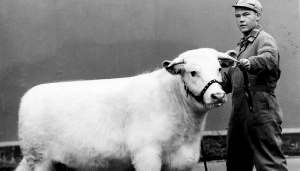
by jphilo | Oct 9, 2015 | Uncategorized
 This Fantastic Friday post comes from October of 2007. It’s one of the first blog posts ever published on Down the Gravel Road. I can’t remember the name of the person who’s funeral is mentioned. But every day, I remember and treasure the lesson my dad taught me each day of his life.
This Fantastic Friday post comes from October of 2007. It’s one of the first blog posts ever published on Down the Gravel Road. I can’t remember the name of the person who’s funeral is mentioned. But every day, I remember and treasure the lesson my dad taught me each day of his life.
On Monday, I went to a funeral for a man from our church. His children paid tribute to their dad during the service. He’d been a wonderful father, who took them hunting and fishing. He coached Little League, encouraging and teaching every child on the team. They mentioned that throughout their adult lives, when they reunited with childhood friends, their friends said hello and in the next breath, “How’s your dad?”
Maybe I shouldn’t confess this, but their memories saddened me. They reminded me of all my father couldn’t do with us. Don’t get me wrong. Dad was a vibrant man who loved children. He would have been a great Little League coach. And though he wasn’t a hunter or fisherman, he would have led our 4-H club. He would have taught us to raise, show and judge cattle because that was what he loved.
But he couldn’t do any of that because multiple sclerosis put him in a wheelchair when he was thirty, my sister was six, I was three and my brother was a baby. So I was sad at Monday’s funeral, not only for the family of the man who had died but also for what our family lost to Dad’s illness.
For the last few days, God has comforted me with truth. Over and over I’ve pictured Dad in his wheelchair while he lived at home or in his bed at the nursing home. And in every picture, his wide face is serious, even sad. Until one of his children or grandkids comes into his presence. Then his face breaks into a big grin that shows his square, white teeth and his green eyes light with delight.
And that is what Dad taught me: a father’s delight in the presence of his children. His delight didn’t come from what we could do for him. He was delighted because we were his children. We had taken time to be with him.
So now I’m thinking about God the Father. When I enter His presence, does His face light up? After all, I’m His child too.
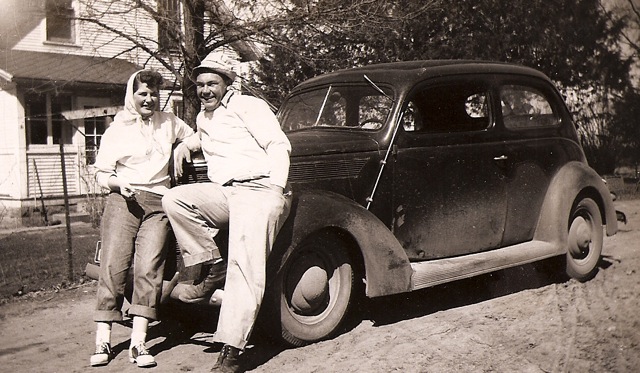
by jphilo | Feb 13, 2015 | Reflections on the Past
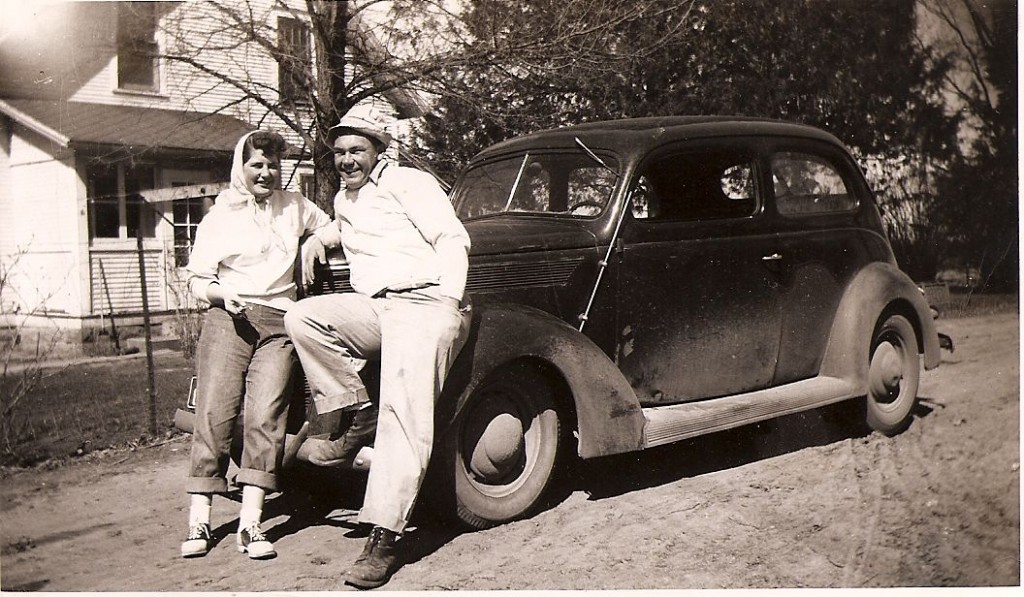
This week marks the beginning of a new Gravel Road feature called Fantastic Friday. Each Friday a fantastic blog post from the past will be given an encore airing. I hope you enjoy what you read as much as I enjoy thumbing through the archives and choosing them.
With Valentine’s Day almost here, this post about Mom’s Valentine wish (circa 2012) sprang to mind immediately. It truly is a favorite post because it shows the depth of Mom’s love for Dad, who died in 1997 after a 38 year battle with multiple sclerosis.
When Mom and I kept our standing lunch date last Tuesday, I mentioned that our next lunch would fall on Valentine’s Day. “That’s kind of fun, Mom. What would you like for Valentine’s Day?”
She thought for a few seconds. “Well, what I really want for Valentine’s Day I can’t have.” She fiddled with her coffee cup. “So I might as well not mention it.”
“Go ahead,” I encouraged her. “What do you really want?”
“What I really want is a few more years with your dad before his mind went…” She paused and moved her fingers in a circle at the side of her head. Her brow furrowed, and her blue eyes looked sad. “…you know, before he was…”
“I know,” I whispered.
“He wasn’t with me that way long enough,” Mom sighed.
I nodded, not knowing what to say. There are no words for Mom’s loss. Dad’s diagnosis of multiple sclerosis at age 29, less than 10 years after their marriage. The love of her life struck down by multiple sclerosis. The end of her dream of being the wife of a county extension agent and mother to an increasing brood of kids. The loss of the bread winner, the protector, and leader of the family she loved so much and taking on those roles for the next 38 years as Dad slowly failed and finally died at age 67.
Now, 15 years after his death, what does Mom want for Valentine’s Day?
Not chocolate.
Not flowers.
Not a card.
She wants a few more years with her husband as he once was.
I looked at her, across the table, and said, “We can’t know what life would have been like if he hadn’t gotten sick. But I do know the life you gave us was a good one. You raised us well.”
She nodded and smiled. “I did a pretty good job, didn’t I?”
“You did,” I agreed and helped her into her coat and out the door.
Hiram’s off tomorrow, so we’re going down together to see Mom. We’ll take her to lunch at Culver’s, one of her favorite places to eat. Mainly because she loves their frozen turtle custard.
Over dessert, we’ll tease her like Dad did. We’ll talk about his love of ice cream, his silly jokes, his infectious grin, the goofy songs he loved to sing, the cribbage rules he invented as he played.
Compared to what Mom has lost, lunch at Culvers doesn’t seem like much. But perhaps, sharing memories of Dad and indulging in the laughter and dessert he loved will bring him to her in some small way. Perhaps, over frozen custard, we can give Mom a memory of what she’s wanted for Valentine’s Day for years.
If you would like to see a certain post on Fantastic Friday, leave a comment in the box below, and I’ll try to find it. Happy Friday and Happy Valentine’s Day to all!
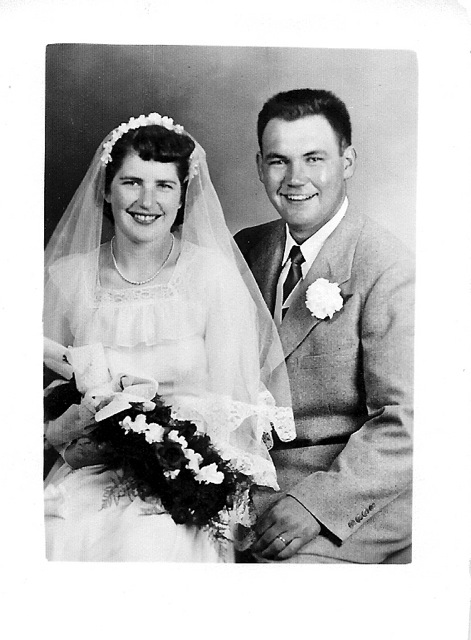
by jphilo | Oct 13, 2014 | Family, Reflections on the Past

Had I been thinking straight way back in June, when I posted a chapter from Lessons from My Father, this would have been the chapter to start with. Now that I am thinking straight and you’re scratching your head about where my parents’ story began, the answer can be found below. Ladies and gentlemen, it’s my pleasure to introduce the bride and groom to you: Harlan and Dorothy Stratton.
The Perfect Picture
And he said,
Naked I came from my mother’s womb,
And naked I shall return there.
The Lord gave and the Lord has taken away.
Blessed be the name of the Lord.
Job 1: 21
“Hello, world, here I come!” he seems to shout from his wedding picture. His broad grin turns his cheeks into plump apples, the dress suit hanging awkwardly on his 250 pound frame. “I’m in here just to humor her,” the twinkle in his eye seems to say. “Just a few more pictures, and I’ll be knee deep in manure again.”
“How will I keep up with him?” her shy smile asks the camera. Wearing her sister’s wedding dress, she looks stylish and petite, but slightly out of place. Her hands, rendered large as a man’s by years of milking, are hidden by her bouquet, her muscular arms covered by bridal lace. “I’d rather be in the barn,” she whispers to the generations gazing at her face.
Exuberant and ready to embrace rural life in the 1950s, they faced the photographer’s camera with confidence. With a honeymoon highlighted by a Chicago Cubs game and a tour of the Chicago Stockyards, could they be anything but Midwestern farmers? A registered Shorthorn breeding business needed building when they returned. They were ready to live the dream they had planned and worked for since they had met in college three years before. They would farm in partnership with his parents, Cyril and Fern, a loving couple who doted upon their only child, my father. They would raise a family, a big family, with lots of kids to help on the farm and keep one another company. They were young, strong, talented, and willing to do all that was necessary to realize their dreams. It was June 3, 1951. Harlan and Dorothy Stratton had the pieces of their married life collected and ready to assemble into a wonderful picture. Over the next thirteen years, like a jigsaw puzzle in reverse, the pieces disappeared, snatched away until none remained.
The picture, at first, came together just as planned. My father and his father quickly built up a herd of Shorthorns. They were poised to provide quality stock to farmers all over the Midwest. My parents had their first child, Jill, in 1953, and she was the apple of her grandparents’ eyes. Then, Fern’s health took a turn for the worse, and everything changed. Her colon cancer progressed at an alarming pace, and the resulting medical bills threatened to devour the farm. Harlan and Cyril dissolved their farming partnership and sold their assets, so that both families were not ruined. That was in 1954. The first piece of the perfect picture was gone.
In 1955, the second piece was removed. Fern Stratton died of colon cancer after a long and agonizing struggle. She was fifty-five years old.
Life as farmers denied them, the couple decided to do the next best thing. Harlan would pursue a career in the Extension Service, through which he could stay close to agricultural life, rubbing elbows with the farmers who tended the fields and animals he loved. Harlan’s exuberance and skill made him a popular and effective county agent. He advanced rapidly in a career to which his personality, training, and experience were perfectly suited. He read voraciously, mostly about agriculture, his nearly photographic memory adding book knowledge to the practical experience he gained working throughout the county. He spent his days traveling the countryside, consulting with farmers about their crops and livestock, providing for them the latest research available from Iowa State University, a land grant college founded to assist the development of agriculture. His expertise with cattle brought him numerous opportunities to train farm kids in the art of showing cattle and made him a sought-after cattle judge at many county fairs.
Dorothy was a busy mother and housewife. She was content to support her husband, complementing his gregarious personality with her own shy competence. She enjoyed basking in the shadow of Harlan’s successes, dedicating herself to her family, which had grown to two when I was born in 1956. Whenever she had the chance, she took education classes at the nearby college. She wanted to complete her four-year teaching degree to become one of the first in her family to graduate from college. “Besides,” she told the housewives who questioned her drive to get her bachelors degree, “it’s a good thing to have, just in case I ever need it.”
Just as they settled into their new lives in Malvern, Iowa, where Dad was the new county extension agent, a doctor pulled away another piece of the puzzle in 1958. Harlan had ignored coordination problems and double vision that came and went for several years. When he couldn’t pass the vision screening for his driver’s license test, he finally went to the doctor. The diagnosis of multiple sclerosis and its rapid debilitating progress nearly robbed him of his will to live.
By 1960 few fragments of the picture remained. Harlan, now the father of two girls and one red-haired boy named John, couldn’t work anymore. He couldn’t show cattle. He couldn’t walk without assistance. He couldn’t drive, couldn’t write, couldn’t see well enough to read, couldn’t even tell if his bladder was full or empty. He was thirty-one years old.
By 1966 the last piece of the picture they thought would be their life together was snatched away. Harlan’s father, Cyril, died at age sixty-seven, his mind and body destroyed by diabetes.
Gone.
The whole picture was gone through no fault of their own. If any couple had a reason to be bitter, my parents did, especially my dad, one of the nicest guys you’d ever care to meet. This man did everything right…honored his parents, went to church every Sunday, played with his kids, worked hard, never said “Bah, humbug” at Christmas. Sure, he ate red meat, but he was a cattle farmer, and this was the 1950s. My mom was right up there with him in nice woman status…studied hard, was a dedicated school teacher, treated her in-laws like gold, rolled out pie crust at the county fair when she was nine months pregnant. Anybody who knew them would say, “They didn’t deserve this.”
So, did they become bitter? Did they tear up the wedding picture of the ignorant young couple so unaware of the pain awaiting them? I’m sure they wanted to, but they didn’t. Instead they looked at that wedding picture and noticed, hiding in the depths of my mother’s gaze and in the laugh lines on my father’s face, the beginnings of a second picture. This new picture was different from the one they had imagined, as tragic as the first one had been hopeful.
In my mother’s eyes glinted a determination to provide for her family, and inside her heart dwelt an extraordinary talent for teaching children, a potent combination that caused schools to snatch her up. In my father’s face were hidden laugh lines attached to invisible strings, pulling his face into a haunted grin, giving him an ability to face his family and the world with a smile, even when his mind was heavy with depression and loss. They stared at this new picture and saw themselves, not as innocent victims, but as confident victors. Over the years, they labored to piece together the new picture of their lives.
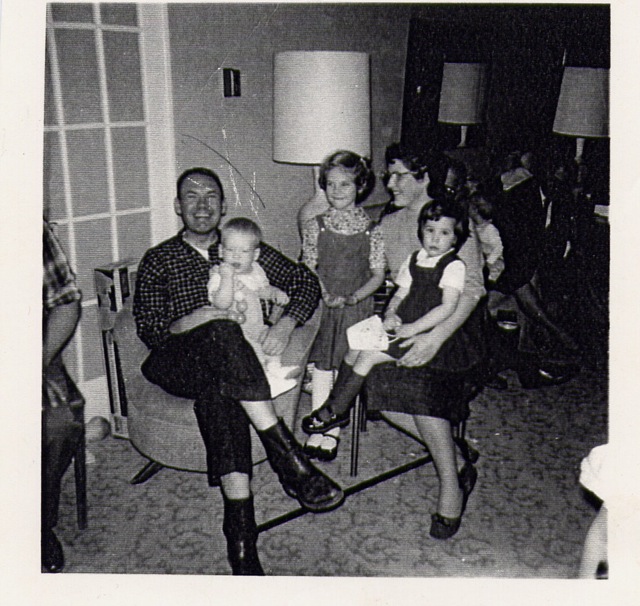
by jphilo | Mar 4, 2014 | Family, Top Ten Tuesday

10. He gave rabbit kisses. No way to describe them. You had to be there.
9. When I was home sick from school, laying on the couch, he would park his wheelchair beside me, and we would watch Captain Kangaroo together. He laughed as hard as I did.
8. Having Dad close by in his wheelchair made me feel safe.
7. He picked Mom’s birthday and Christmas gifts carefully. He looked through the newspaper ads and phoned the store to quiz the clerk for a long time about whatever gift he wanted to buy. Once he made his decision, he arranged to have the gift delivered when Mom was at work.
6. Dad loved to play cards with friends, but he didn’t play to win. He played to talk.
5. He was never, ever a picky eater. He ate with gusto whatever was served and always complimented the cook.
4. Dad never allowed discussions about politics to become cut throat. His most barbed political statement referred to his right arm, severely weakened by multiple sclerosis: It’s my Republican arm. Not good for much of anything.
3. His thousand-watt smile and sense of humor.
2. He was always happy to see people. Always.
1. Dad rarely showed bitterness during his 38 year battle with multiple sclerosis. He was 29 when it was diagnosed, 31 when he required a wheelchair and retired, 54 when he entered a nursing home, and 67 when he died. I am so grateful for his example, his influence, and the years his life intersected mine.
Oh, Dad, I miss you!
In memory of Harlan John Stratton: May 11, 1928–March 4, 1997.
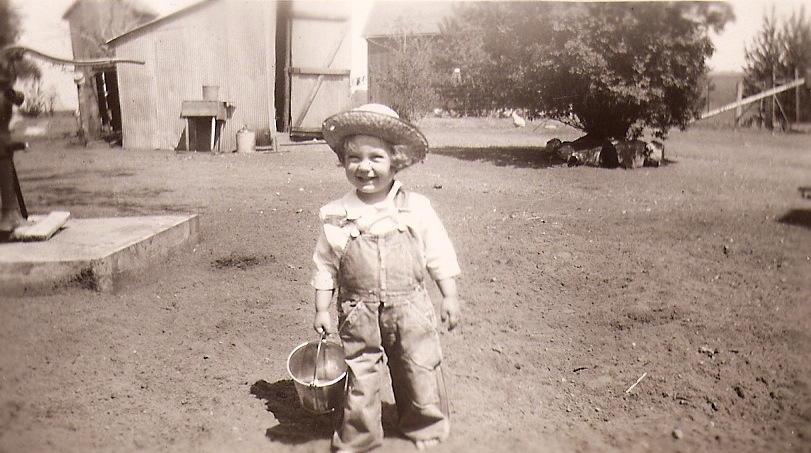
by jphilo | Mar 4, 2013 | Family

Sixteen years ago this day, my father died.
He was born almost 68 years earlier, the long-awaited and only child of his doting parents, Cyril and Fern Stratton. Maybe because he was an only his parents, who raised him on an Iowa farm during the Great Depression, could afford to take so many pictures of their little boy. Maybe caring for only one child gave his mom time to glue the photos on the black pages of an album and label them in her careful handwriting with a white-inked pen–page after page of quaint photos in which little Harlan looks like a member of the Little Rascals gang.
It’s hard to reconcile the blond-haired toddler in the pictures with my dark-haired dad until I see my father’s smile and joyful spirit shining on the child’s face. Then the resemblance is startling, striking, because throughout his life, Dad was a child–even a rascal–at heart.
When we were young, he was our kindred spirit. My brother, sister, and I loved to be near him. We snuggled close to him on the couch, though we learned to keep a wary eye out for his finger pokes and tickles. He taught us silly songs, showed us how to make goofy faces, and laughed until he cried at the television shows that made us laugh until we cried, too.
On summer days, when Dad wheeled his chair outside and parked in the driveway, the neighborhood kids came running. Children swarmed around him as he told jokes, handed out nicknames like candy, and–until Mom put a stop to it–gave wheelchair rides to those daring enough to climb into his lap.
As the years went by and multiple sclerosis stripped away Dad’s physical abilities, his speech, and finally, his memories, when all he could do was lay in a bed or sit propped up in a wheelchair, the presence of little children stirred him to life. His eyes followed the movement of his grandchildren. His head turned to the sound of the high, piping voices of his grand-nieces and nephews. A grin spread across his face and he snorted with laughter.
In the presence of children, his spirit broke through the walls of his ravaged body. For a moment, the man we missed so much returned. For a moment we saw, that despite a long struggle against a cruel and devastating disease, our father was still a child–and even a rascal–at heart.
Oh, Dad, I miss your smile.
In memory of Harlan John Stratton: May 11, 1929–March 4, 1997

 This Fantastic Friday post comes from October of 2007. It’s one of the first blog posts ever published on Down the Gravel Road. I can’t remember the name of the person who’s funeral is mentioned. But every day, I remember and treasure the lesson my dad taught me each day of his life.
This Fantastic Friday post comes from October of 2007. It’s one of the first blog posts ever published on Down the Gravel Road. I can’t remember the name of the person who’s funeral is mentioned. But every day, I remember and treasure the lesson my dad taught me each day of his life.





